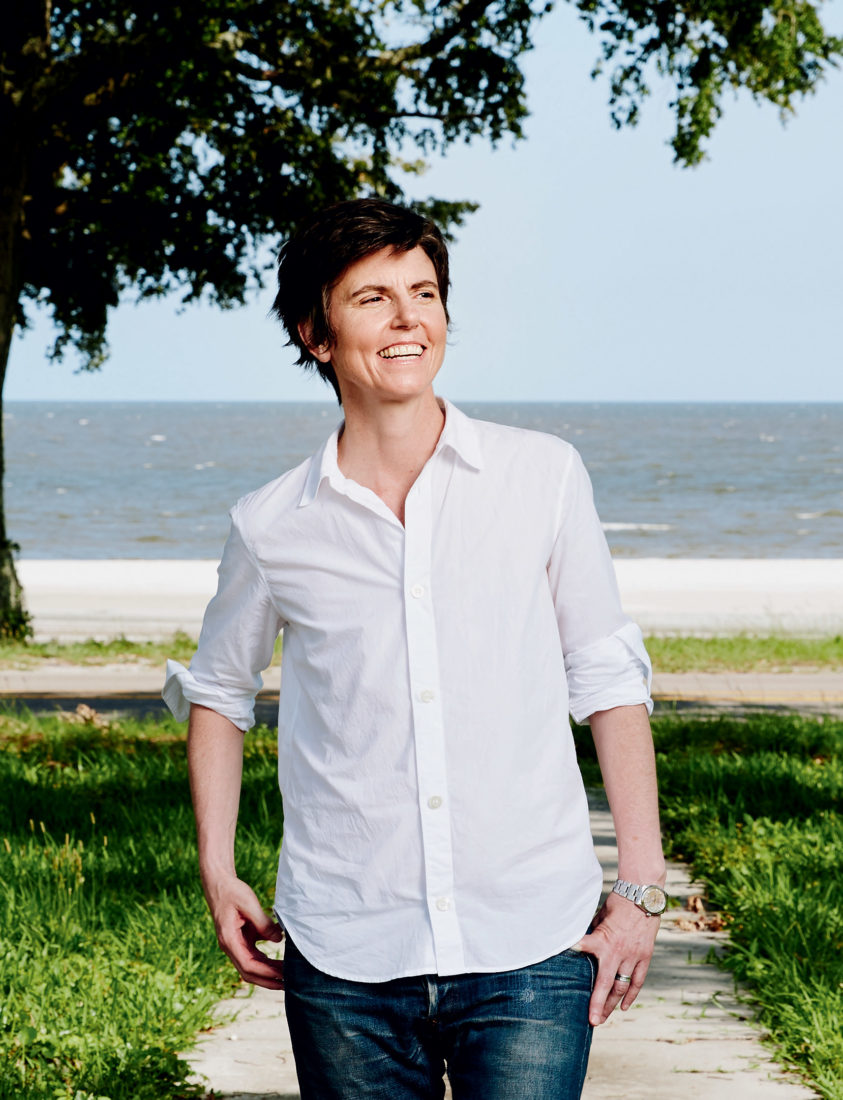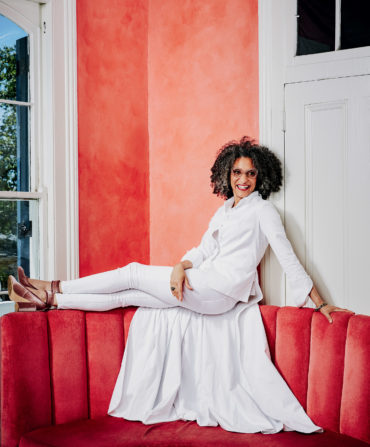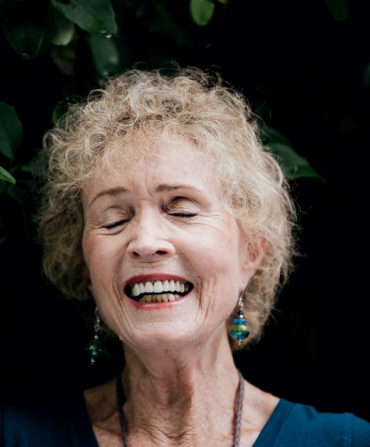Comedian, actress, and writer Tig Notaro is walking in Hollywood with her wife and creative collaborator, Stephanie Allynne, when she abruptly stops and starts chuckling. They realize they’ve found themselves standing below a massive billboard of Notaro’s face, advertising her latest Netflix stand-up special. It’s a peculiar, serendipitous set of circumstances of the exact sort that delights Mississippi native Notaro, a master of irony and circumspect observation.
“Well, I wasn’t expecting that,” she says wryly, as Allynne snaps a photo. Having survived both a near-fatal intestinal infection and breast cancer in 2012, the same year her beloved mother passed away from an accident, Notaro has grown adept at handling the unforeseen. Her comedy set about those tragedies became the stuff of legend—her refusal to be beaten by fate, her determination to find humor and grace in the mire, and her willingness to be vulnerable touched people in ways that stand-up rarely does, the audience weeping as much as laughing. It was a gutsy move, one Notaro says she owes to her Southern spitfire mother, Mathilde.
Your mom was unconventional.
[Laughs.] Oh yeah, very much. She empowered me to be myself, to say to hell with folks who didn’t get me.
Getting that message as a girl, particularly a Southern girl, is rare.
My mother was taught to be a pleaser, but she really rebelled against it and encouraged me to do so as well. I don’t think I realized when I was young that it was unusual for a mother to be advising her kid to tell everyone to go to hell. My mother was very flawed, but the strength and confidence that she instilled in me are solidly there. I know I got that from her.
Was that confidence and autonomy the best gift she gave you?
That and my sense of humor. She was a wilder, louder version of me. But somehow still the same. We have similar sensibilities. My mother pranked everybody all the time. She loved to see a prank unfold, and I’m the same way. She used to send water shots to people at bars and restaurants. [Laughs.] And you’d see people nod and thank her across the room, and then you’d watch them toss back a shot of water.
You quit school in the ninth grade. How did your mother react to that?
My mother wanted me to go to school, but when I quit, she accepted it pretty quickly, and then began bragging to people that I dropped out. “Yeah, Tig’s off doing her own thing. She’s doing great!” And people are like, “She dropped out of high school!” [Laughs.] My mother just told them I was happy, to leave me alone.
You’re a mother of twin boys, two-year-olds Finn and Max.
When I was a kid, I’d hear bad news, something happening in the world, and it would upset me and I’d want to tell my mother. And she would say, “Sweetie, please, I can’t. I can’t hear that.” It really pained her.
Now as a mom, you know why.
I’ve always been very compassionate and empathized with people, but it’s a whole different depth of pain and cutting I feel as a mother when I know people are suffering. I see Max and Finn in everyone.
What do you and Stephanie most want to impart to your children?
Having my health issues and losing my mother and experiencing fear of the end—they teach you what’s important. And it’s to spend time together, to be a family. Before the boys, life felt all over the place. I can’t believe how responsible and focused and excited for my future I am in a way I’ve never been before. I can’t believe this dropout failure could find so much joy and success.
You were raised in Pass Christian, Mississippi, and Spring, Texas.
Pass Christian is picturesque. As a child, I was always up a tree or following a stream for miles. When it was time for dinner, my stepfather would have to put on his rubber boots to try to find me, and he’d follow a stream and there I’d be, catching frogs.
What defines the South for you?
The people. It took me a long time to realize these people were genuine, true characters. I’d bring home friends and their jaws would drop. Oh my gosh, your aunt, your uncle. And I was like, What? I didn’t realize there was anything different about them. I couldn’t see it. [Laughs.] Once I went out into the wider world, I was like, Yeah, I guess they are kind of interesting people.
Do you see that eccentricity in yourself?
The way that I go about things, the essence of who I am, is Southern. When people go home with me, they’re like, Oh, right, this is why your pace, your sensibility, your delivery, is the way it is.
Do you think there is such a thing as a Southern sense of humor?
I do, but I also think a Southern sense of humor can take many different forms.
Most Southerners seem to have a firm grasp on the absurdity of life.
Oh, for sure. I personally love absurdity.
Where are you happiest?
When I cross the Mississippi line and the sign says, WELCOME TO MISSISSIPPI, I am just, like, Ahhhh, I’m home. I love being there with Stephanie and the babies. I have a very big, extended family. We’re always fishing or water-skiing or picking berries. So much of what I spent my time doing as a kid in Mississippi I’ve taken along with me. Because no matter where I am, or what I’m doing, I’m rooted there.
Read more from our August/September 2018 Southern Women issue








